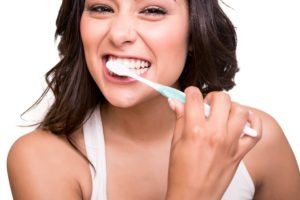
Are you doing everything you can do to avoid dental cavities? Over the years, have you been diagnosed with more cavities than you’d care to admit? In fact, when you look at your smile, does it seem like there are more fillings than healthy strong teeth? If so, you may have set out to spend this year enjoying unprecedentedly good oral health. But are you really doing all you can to prevent cavities and other dental problems? Preventative dental care doesn’t have to be complicated. You simply need to take your dentists’ advice about how to properly protect those pearly whites of yours!
Cavities impact nearly all of us, as only between 1% and 2% of the populous are immune to dental caries. When one forms, we can provide a natural looking solution, such as a tooth-colored filling or a ceramic dental crown. However, you can learn how to avoid cavities. With the right steps you can reduce your risk of developing them in the first place.
Add Flossing to Your Daily Routine to Avoid Dental Cavities
Yes, brushing your teeth twice a day is important. It is even better when you use an electric toothbrush. But if you’re not flossing on a daily basis, then you are missing a key step of a proper preventive care routine. That’s because flossing helps to remove more of the plaque bacteria that can lead to gum disease and cavities, if left to remain on the teeth or stuck between them, where only flossing can effectively reach.
Drink more water to avoid cavities
Most people think about dental hygiene, when they think about protecting their smiles, but diet plays a huge role in oral health, as well. The more sugar you consume on a regular basis, the more likely you are to struggle with gum disease. Fortunately, drinking more water (and consuming less sugar) can help to protect the smile. Every time you reach for water, you are helping your body produce saliva, a natural defense against plaque buildup. Furthermore, when you’re drinking plenty of fluoridated water throughout the day, you are less likely to turn to sugary beverages, like sodas, juices, and sweetened coffees and teas that can wreak havoc on your smile. Chewing gum can be good for your teeth because it also stimulates saliva flow.
See your dentist more than once a year.
While many people grew up being told that visiting the dentist once a year was all that was needed to keep the smile healthy, most dentists agree that bi-annual visits are actually necessary for most patients to adequately prevent cavities, and some people might need even more frequent dental cleanings, or even added periodontal care. So this year, make sure you schedule at least two visits for key preventive care, including a checkup and cleaning. Children and adults benefit from dental fluoride treatments.
Try Our Quiz on how to avoid Cavities
- True or False: Brushing and flossing can help.
- True or False: You need to have your teeth cleaned.
- True or False: Certain foods can lead to decay.
- True or False: Untreated injury can allow decay to form.
Answer Key
- True. When you brush and floss your teeth, you remove food particles from on and between your teeth. Removing these particles prevents bacteria from breaking them down, a process that leads to plaque buildup. The buildup is a bacterial byproduct that can weaken tooth enamel and inflame gum tissue. You should brush your teeth twice a day for two minutes each time, and floss every night before bed.
- True. While brushing and flossing can reduce the amount of plaque that forms, only a dental cleaning can completely remove the buildup. You should see us every six months for a routine dental cleaning. In addition to plaque removal, the procedure also helps freshen hour breath and brighten your smile. Make sure that you are taking good care of your toothbrush also.
- True. When you consume foods and drinks high in sugar, then you leave behind particles for bacteria to break down. Instead, try to drink more water and substitute candy and sugary/starchy snacks with fresh fruit, veggies, nuts, and dairy products.
- True. If you chip or crack a tooth and don’t seek treatment, then the damage can make the onset of decay more likely.
Learn more about how to avoid cavities
We can help you avoid decay and in the event you develop a cavity, we can provide a lifelike solution. To learn more about how to avoid cavities, schedule a consultation or a dental checkup by calling us at 847-234-0517. We also proudly serve residents of Chicago and all surrounding communities in the Chicago Metro area.
